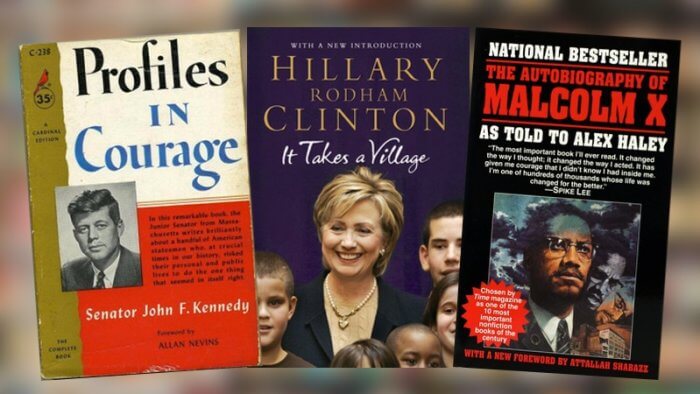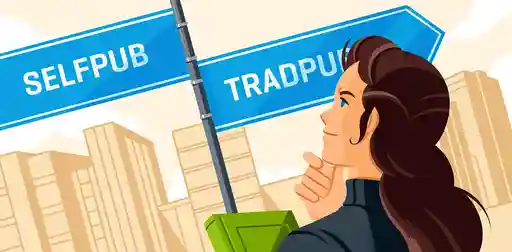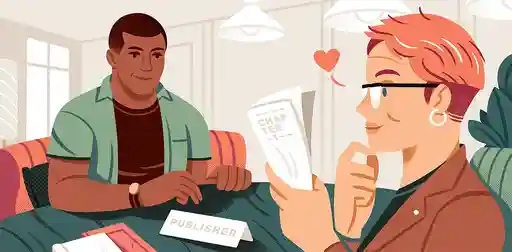Blog • Understanding Publishing
Last updated on Oct 15, 2025
Stuck on your first draft? Call a developmental editor... or a ghostwriter
Savannah Cordova
Savannah is a senior editor with Reedsy and a published writer whose work has appeared on Slate, Kirkus, and BookTrib. Her short fiction has appeared in the Owl Canyon Press anthology, "No Bars and a Dead Battery".
View profile →So, you’ve got an original idea for a book. Maybe it’s the memoir you’ve meant to write for years, or a stunning business book designed to shake up the status quo in Silicon Valley. Once you have this idea, how do you turn it into an actual manuscript?
Writing a book is no simple task, which is why published authors often work with an editor to develop their ideas before they even type ‘Chapter One’ on the top of a blank page. But for you — the independent author who doesn’t have a book deal, let alone a dedicated editor at a publishing house — who can you turn to for help with your first draft?
You’re spoiled for choice with the quality of publishing professionals you can find on the web (*cough* Reedsy *cough*), but who’s your first call? We spoke to editors and ghostwriters on our network who were happy to shed some light on the professional help available to authors at the start of their creative journey.
If you’re truly not sure how to approach your first draft, but you’re passionate about the seed of an idea for a fiction or nonfiction book, the person you may want to contact is a developmental editor.
What is developmental editing?
Sometimes, this is called “structural editing” or even “substantive editing.” No matter what terms you use to describe this type of work, know that it involves developing the big ideas in your book (hence the popular term, “developmental editing”). In the broadest sense, a developmental editor will not be correcting your misplaced commas. Instead, you’ll be collaborating with someone who specializes in the fine art of idea generation and concept clarification.
With fiction, developmental work might involve high-level discussions on character arcs, themes, plotting, and pacing. By getting all these elements in place before a first draft, you could potentially save a lot of time and money in rewrites. Fiction editors will often work with authors at any point of the writing process, whether you have 50 pages written or nothing more than an idea. Developmental editing can also be useful if you’ve completed the first draft and don’t know how to move forward with revisions.
Q: What should clients expect in terms of feedback and revisions during a developmental edit?
Suggested answer
With a development edit, what I'm giving you is a full health check and service of your novel. This is a close, hands-on edit of your story, focusing on narrative development, characterisation, dialogue, story-telling, and the clarity of your authorial voice and your prose. Essentially, my aim is to help you get the best out of your novel and give you the best advice possible. With several decades' experience working in genre publishing, I have an excellent idea as to what markets are out there and where to best place your novel.
You can expect to receive the edited novel with my changes tracked and comments included. Through the tracked changes you will be able to see my advice on what you can change and consider in revising your novel. I always track changes, as a development edit is a collaboration with the client. I'm using my extensive experience to make judgements on what works and what doesn't, but at the end of the day you have to be happy with those changes, and that they are true to your vision for the work.
As well as the full edit, I also provide my clients with a copy of the chapter and style notes I make as I edit. These are an immediate record of my process, showing my thoughts on each specific chapter. Clients also receive an editorial table, which is what I use to keep track of the spelling of names, unusual/unique terms, and places in the novel, as well as keeping track of essential characteristics, such as hair colour. I also provide my clients with a book report. This is an overview and analysis of the novel, detailing my key findings and suggestions as to revisions the client can consider and what next best steps they may also consider.
Finally, I offer to follow up with my clients in a one hour Zoom or Skype call, which is their opportunity to ask me any further questions they may have, as well as to discuss my edits in detail.
Jonathan is available to hire on Reedsy ⏺
I define a developmental edit as a comprehensive review of a book’s strengths, weaknesses, and opportunities for revision. With your manuscript, I’d read it and consider its pacing, plot, character development, voice, and other building blocks of storytelling. After reading the draft, I’d deliver to you a detailed editorial letter (no shorter than 3,000 words). The other "deliverable" from this service would be a detailed annotation of the manuscript. Using Track Changes, I would point out in-text examples of what's working, what's not, and potential paths forward as you continue shaping the manuscript. I find that this tool can be especially helpful for authors who want specific examples identified for them throughout the text. My expectation is that these two deliverables can help you improve the current manuscript while also adding to your knowledge base long-term. Hopefully, they’ll be resources you can revisit again and again.
Kevin is available to hire on Reedsy ⏺
A nose-to-tail structural edit of your manuscript for authors who have taken their book as far as they can by themselves.
- Detailed recommendations to improve “big picture” concerns like characterization, plot, pacing, setting, etc.;
- Specific guidance on elements of writing craft;
- In-line suggestions and edits in the manuscript.
Brett is available to hire on Reedsy ⏺
Non-fiction developmental editing
If you’re looking at an autobiography, business manual, or any book in the realm of non-fiction, specialist developmental editors will take a goal-oriented approach to develop your plan or book proposal.
“I've worked with authors at the initial idea stage to help them hone the scope of the book and audience," said Claire Ruston, a UK-based development professional. "I'll discuss with the author what they're aiming to achieve with the book (is it to promote their business, for example) and who they're aiming at.”
Unlike fiction, Claire suggests that early stage developmental editing in non-fiction will often involve a lot of structural work.
“Sometimes I may work closely with an author to develop a full table of contents right down to Level 2 headings, giving them a detailed structure to write to. If an author is struggling to map out their book, early-stage developmental work can be incredibly valuable and save a lot of time further down the road.”
Okay. Now that you’ve worked with a developmental editor to put all your pieces in place for your book (fiction or non-fiction), all that’s left is to write the damn thing.
Still not sure you want to write your book? Keep reading.
Q: What, in your opinion, is the most important job of a developmental editor?
Suggested answer
A developmental editor should be able to provide a clarifying, 30,000-foot view of your work. They should also present you with actionable recommendations for navigating your eventual revision, and those suggestions should align with your aims for your work. In other words, the best developmental editors help assess and deftly improve your work on your terms.
Often, when a writer is ready to hire a developmental editor, they can no longer see the forest through the trees. They've named and renamed their protagonist twelve times, substituted commas for semicolons, and have usually read the manuscript more times than they'd like to admit. Hopefully, a good developmental editor will help you reset and see the draft with fresh eyes. They should be able to articulate the draft's aims, successes, and drawbacks in a way that's recalibrating for the author. And when it comes time to propose changes, that editor should be able to articulate the clearest, deftest path forward for the author.
Kevin is available to hire on Reedsy ⏺
Developmental editing differs over the different genres. Developmental editing for a novel is not the same as developmental editing for a poetry collection or a memoir, For instance, for a novel, developmental editing would include compiling notes on things such as coherence, characterization, plot lines, time lines, POV, writing style, and internal logic. For a poetry collection, it would be things such as poem flow, strength of individual poems, integration of the poems within the collection, etc.
However, there is one factor that remains the same throughout—and that is the task (nay the duty) of the editor to maintain the author's vision. Too often editors will mess with an author's "voice" under the guise of developmental editing. Developmental editing consists of improving the author's voice/vision while ensuring that, at the end of it all, it is still the author's voice/vision and not any imposed by the editor.
Michael is available to hire on Reedsy ⏺
Building a story is like building a house: First, you lay the foundation. You build walls and lay down pipes before you start thinking about painting walls and hanging wallpaper. Before we worry about the line level, we talk about the building blocks of a story.
It's normal to make big revisions after a developmental edit; in fact, it's almost always necessary. That's why it's helpful to do a dev edit after two or three drafts. You don't want to be too attached to anything at the line level before you've made sure your foundation is sound, just as you wouldn't hang wallpaper before you did the wiring.
In a developmental edit, we look at everything from characters' internal motivations to their plot arcs, from world building to conflict.
This is my favorite part of the writing process. When someone writes a story, they tell it to themselves. When they edit a story, they learn how to tell it to a reader. It's the step of the writing process that teaches us the most about how to be writers and how to communicate our visions to our readers.
Wendy is available to hire on Reedsy ⏺
What if I want to work with a ghostwriter?
Ghostwriters are a dime-a-dozen in the world of non-fiction, where authors often come from a non-writing background. The chances are good that you’ve read a ghostwritten book or two without knowing it.

“So many authors find themselves in this position — having the basis for a great book, but lacking the time to turn it into a fully rounded book,” said Jeremy Blachman, a New York-based author and ghostwriter. "The more business-oriented work I've done tends to start with at least some articles that the client has written (or helped write) that they want to expand into a book.”
You can approach a ghostwriter with little more than an idea, then work with him or her to shape the book. If you’ve already worked up a book proposal with a developmental editor, your ghost can use that document as a launch pad.
While it’s certainly a ghostwriter’s job to create the content for your book, you will often be deeply involved in the creative process. Almost all collaborations start with a conversation that allows the ghost to determine the author’s “voice.”
“Talking to them, hearing how they express ideas, starting to get a sense of how they think,” said Blachman. “Reading what they've written. Asking what they like to read. Seeing their reactions to different versions of what I create. I've written a few different versions of an opening and asked a client: which one is closest to the tone of the book you're envisioning?”
Should I get a ghostwriter for my novel?
Bear in mind that the vast majority of ghostwriters work in non-fiction. Ghostwritten fiction does exist, but it’s incredibly rare. Writing fiction is supposed to be creatively fulfilling. Hiring a ghost to write your novel is like buying a sports car and then paying someone else to drive it for you: it happens, but it doesn’t make much sense.
Do I have to credit my ghostwriter?
As for the question of authorship, experienced ghostwriters will have made peace with their anonymity and are broadly comfortable with you taking full credit for the book.
“Speaking from a non-fiction perspective, the book is grounded in the author's ideas and expertise,” said Claire Ruston. “They may have had help getting the words on the page, but it's wholly and unquestionably the author's book.”
If you want to find out more about choosing the right ghostwriter, check out this great post from Reedsy’s Andrew Crofts — perhaps the world's most successful ghost.
Ghostwriting and Developmental Editing: Where the lines blur
As we’ve discovered recently, many ghostwriters have experience as editors and will sometimes work with non-fiction authors to plan a book and even write a proposal. Authors who go down this route have the option to either write the first draft themselves or hire the same ghostwriter to complete the job.
Many editors would warn against this approach, pointing out that editing and writing are different disciplines. While many ghostwriters will provide developmental assistance, not all will have a truly editorial mindset.
Q: What’s the difference between editing, ghostwriting, and book coaching?
Suggested answer
Editing is working to improve a manuscript that is already written. Book coaching is assisting the writer in the planning and writing process to make sure the outline and idea is strongly in place before writing even starts. Ghostwriting is having another author write the entire book or parts of the book based on the idea[s] of the author.
Melody is available to hire on Reedsy ⏺
Don’t give up. Assemble your A-Team.
The point we want to stress is this: writing doesn’t have to be a solitary pursuit. Whether you work with an editor to develop your book or hand over the reins to a ghostwriter, there's nothing wrong with collaborating to bring your ideas to life. Publishing a successful book is a team sport, and half the game is knowing who you want on your side. So if you’re not sure how best to approach your first book, ask for help.
If you have any questions about your developmental editing and ghostwriting options, drop us a question in the comments below, and we’ll do our best to answer it.







3 responses
manchegauche says:
16/09/2016 – 17:22
I'm so blocked I need a ghost writer to finish this comm
↪️ Nick Pavlidis replied:
21/09/2016 – 14:19
ent. Happy to help.
David ab says:
21/09/2016 – 15:47
I always though that ghostwriters were authors' greatest nightmares!